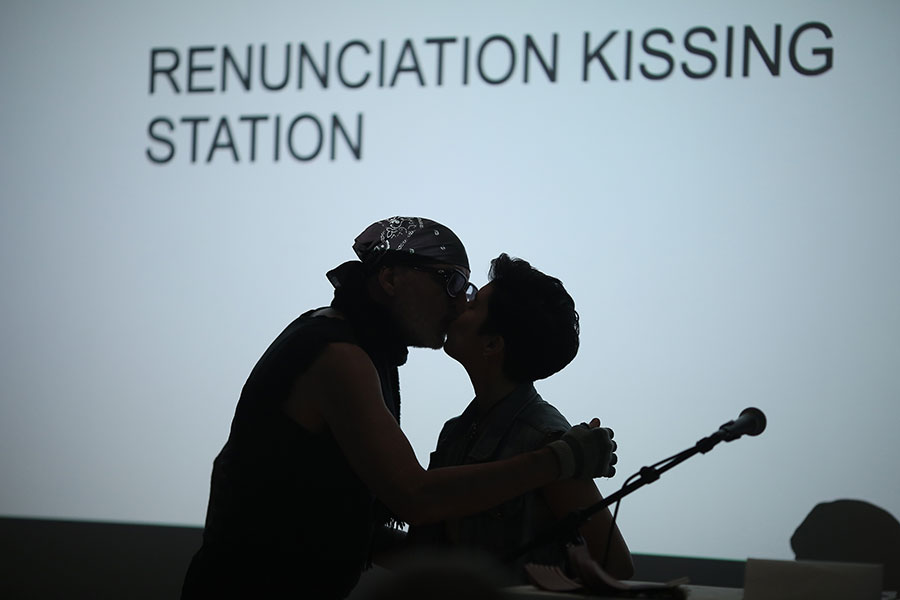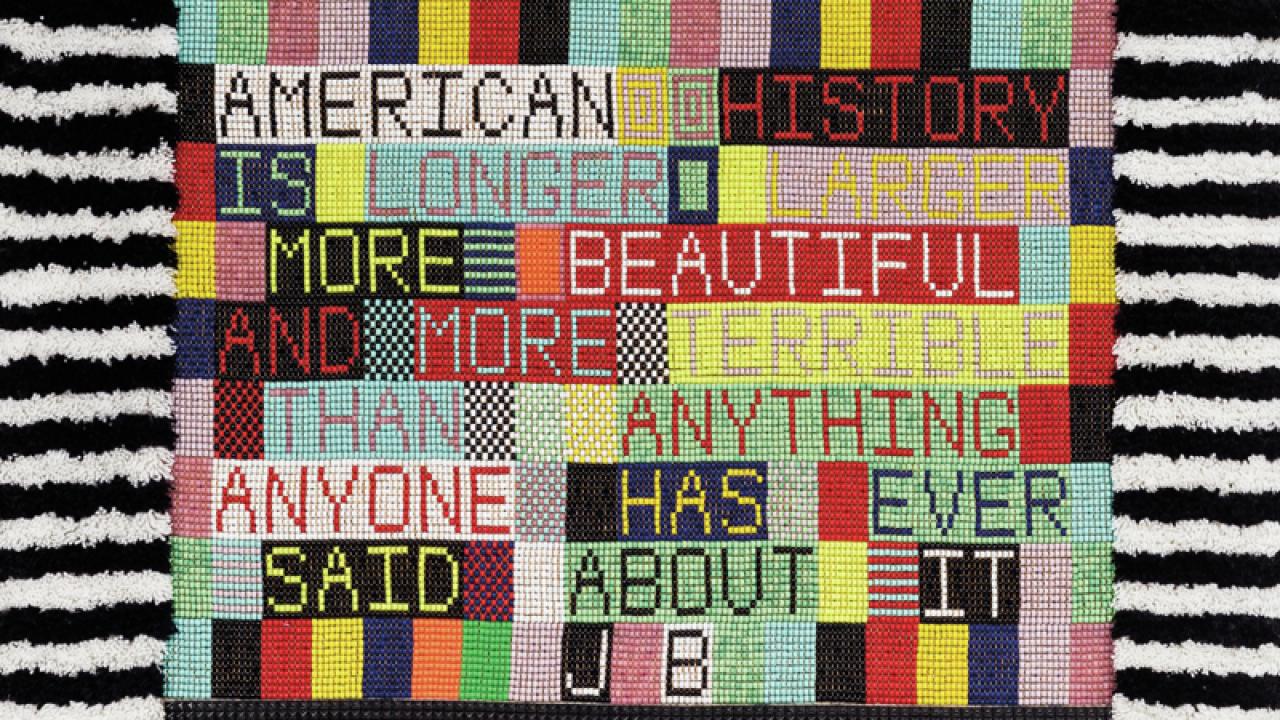The New Red Order Promote Indigenous Futures
At Artists Space, New York, the 'public secret society' expands its ranks
At Artists Space, New York, the 'public secret society' expands its ranks

Motivational slogans in bright blue capital letters tell us to: ‘PROMOTE INDIGENOUS FUTURES’ and ‘CREATE A BETTER TOMORROW TODAY’. These and similar phrases loom large in part one of Never Settle (2019-ongoing), an in-progress recruitment video for the New Red Order (NRO) – the self-declared ‘public secret society’ that is less artists’ collective than continually expanding and evolving association and collection agency for colonial debts. Its core contributors, the New York-based Indigenous artists Adam and Zack Khalil (Ojibway) and Jackson Polys (Tlingit), recently held a live event at Artists Space in New York, titled ‘New Red Order: Informants Get Paid!’ There, they recursively rebounded the audience’s guilt, desire and imagined relationship with Indigenous peoples, asking how a society in which ‘playing Indian’ is as American as apple pie can be anything other to the Indigenous observer than the greatest post-apocalyptic parafiction of all time.

The recruitment video served as an entr’acte to an evening of short films, readings and live performances by Indigenous and non-Indigenous members – known as ‘informants’ – of NRO’s (r)evolving cast. An unnerving and unresolved form of land acknowledgement delivered by Artists Space curator, Jamie Stevens, preceded the screening. Actor Jim Fletcher appears in most of the NRO’s content as a leadership proxy. (Referencing the acceptance speech that Native American actress Sacheen Littlefeather delivered on Marlon Brando’s behalf at the 1973 Academy Awards, Fletcher refers to his role as that of a ‘reverse Brando’.) Other informants acknowledged their implication in the decolonial process and struggle. As a means of unearthing the inherited history of his hometown, Quincy, critic and curator Ed Halter of Light Industry read a text about the colonist Thomas Morton’s failed attempt to create the utopian settlement of Merrymount. This segued nicely into City Seal (2018), a video produced in collaboration with Tony Oursler, in which the seal comes to life, with Fletcher, in costume, insisting that he is only playing the role of a man playing the role of an imaginary Lenape character, called Sinister, in conversation with a sceptical sailor colonist.
Lou Cornum (Diné) read their text ‘Desiring the Tribe’ (2019) from the first issue of gay communist zine Pinko. Later, following a psychedelic music-video journey through a landscape populated by burning farmsteads and Doric columns tapped for maple syrup (A Love Letter to the People, 2020, by Anishinaabe musician Sacramento Knoxx, a member of Detroit-based creative collective The Aadizookaan), Cornum returned to lead an ‘Indian Captivity Kink Workshop’. Bold audience members were invited to burn miniature US flags in exchange for a kiss from ‘safe savage lips’. For a ‘No-peep Show’, white viewers were told to put on blindfolds and insert ear plugs so intimate insider experience could be withheld from their voyeurism – only serving to heighten their yearning for exotic authenticity. Cornum tapped into a central tenet of the NRO: the channelling of a fervent desire for the Indigenous (expressed through appropriation, commercialization, romanticization and centuries of collecting) to productively promote Indigenous futures.

The final video in the programme, part two of the film/infomercial Never Settle – first screened as part of the group’s eponymous installation at last year’s Toronto Biennial of Art – is a deeper explication of the NRO’s tactics and principals. It features NRO recruits gushing over the impact the society has had on their lives and acting out their most inappropriate desires towards Indigeneity – burning sage, wearing regalia – with the help of anonymizing silicone masks. To become true accomplices in the decolonial struggle, inductees are taken through the ‘three cs’: contract, concealment and capture. Contractual treaty processes and the coproduction of protocol, Fletcher explains, bind participants to the NRO, while concealment through the custom-fitted masks allows them the freedom of anonymity. Capture, the most speculative and provocative element of the NRO’s programme, sees their accomplices moving through museum collections and scanning objects with smartphones to ‘spectrally liberate them’. The resulting 3D-renderings were included in Culture Capture (2018), a video in which monuments to the white imaginary are virtually disfigured into calcified and tumorous digital grotesqueries. Accomplices in the anticolonial struggle, the NRO maintains, must reconfigure colonial structures – including through crimes against present-day representation and reality – in order that they can be transformed.

Following the video programme, genre-bending musical performances by Pvssyheaven (Rose Mori), Sunk Heaven (Austin Sley Julian) and Wetware (Roxy Farman and Matthew Morandi) took up the NRO’s call to ‘commit crimes against reality’ with experimental electronica and disfigured soundscapes delivered as the performers crawled under tables, struck provocative poses and aurally implicated the audience in their transgressions. The event’s debris formed an installation that remained on view over the weekend. Overturned chairs filled the floor as the videos played on loop on the walls. A newspaper vending machine distributed free copies of Never Settle! Special Future Recruit Issue (2019), an NRO publication designed and printed by Inpatient Press and filled with ‘spot the difference’ games intended to introduce young people to the ‘exciting, growing field of Savage Philosophy’. The NRO’s recruitment desk, brandishing banners that promised to ‘increase your business by over 400 percent using Savage PhilosophyTM’, was manned throughout the event and installation to enable new informants to sign up to the ever-growing society.
When asked how Artists Space envisions performance in its future programme, executive director and chief curator Jay Sanders suggested that the curatorial team is keen to explore more commissions like NRO’s recent project, which take advantage of their new two-storey location. ‘The hybridity we have here of simultaneity in multiple linked spaces is most exciting,’ he said, ‘so we’ve been actively experimenting with that.’ The NRO will also be investigating new spaces this year. On 22 January, Performance Space announced that a group of New York-based artists and collectives, including NRO, have been invited to run the organization for a year-long project, titled ‘02020’. It seems this public secret society has a gift for capturing cultural institutions and inducting them into its ever-expanding body of informants.
Main image: New Red Order, ‘New Red Order: Informants Get Paid’, 2020, performance documentation. Courtesy: Artists Space, New York; photograph: © Paula Court




















